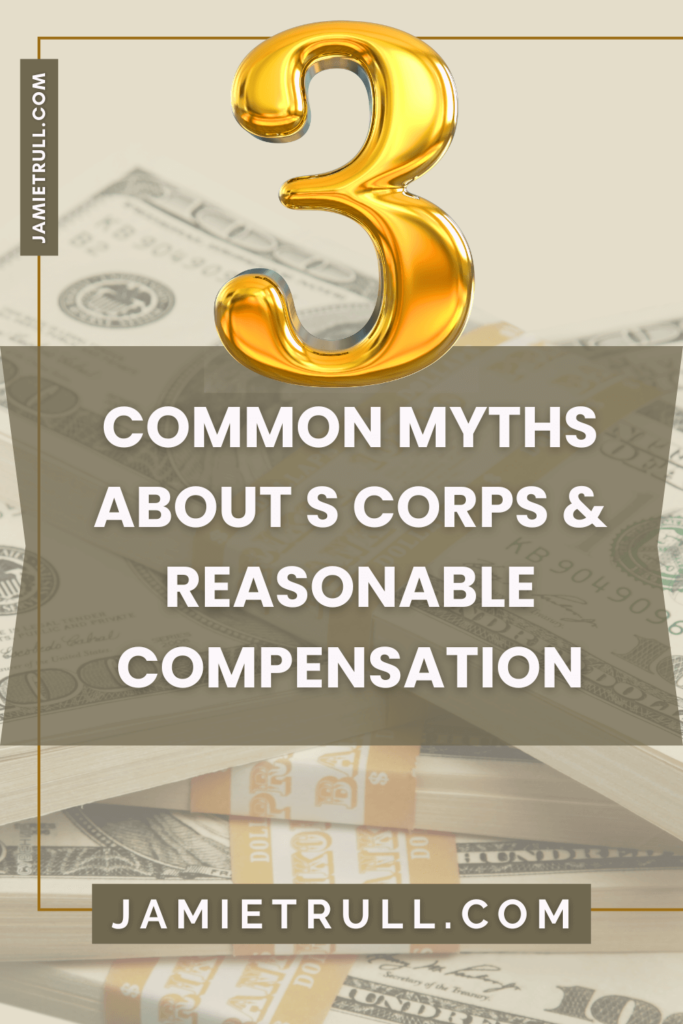
As a small business owner operating under an S Corporation, it’s vital you calculate your S Corp income correctly.
You know the importance of paying yourself a reasonable salary—but how can you be sure that you’re setting it properly in the eyes of the law? Getting audited by the IRS and being asked to defend your salary can lead to hefty penalties if not managed properly.
In this insightful interview, Jamie Trull, CPA and financial coach, sits down with Abby Dever from RC Reports to explore the key do’s and don’ts of reasonable compensation. They also dispel common myths, share real-life IRS audit stories, and explain how documentation can save you thousands.
Reasonable Compensation: How To Calculate S Corp Income
When you own an S Corp, the IRS requires that you pay yourself a reasonable salary for the work you do—on top of any profits or distributions you take from your business income. Failure to do this correctly may result in fines, back taxes, and penalties.
Read our easy to understand guide: What is Reasonable Compensation?
Don’t Make This Mistake: Avoid Bad Advice from Social Media
Jamie and Abby kick off the conversation by highlighting the number one mistake S Corp owners make: relying on poor advice from places like TikTok, Reddit, or even well-meaning accountants.
Abby warns, “A lot of what you see online might seem helpful, but without accurate data and IRS-approved methods, you’re walking a dangerous line.”

Common Myths About S Corps and Reasonable Compensation
Abby identifies several misconceptions about reasonable compensation that can hurt S Corp owners:
Myth #1: Every Business Owner Should Be an S Corp
Not all LLCs or businesses benefit from switching to an S Corp. Factors such as profitability, future growth, and income tax savings must be considered.
Jamie emphasizes: “It’s not a one-size-fits-all decision. Get an analysis done based on your business.”
Myth #2: Follow the 50/50 Rule
A common myth is that owners should split their total pay 50% between salary and distributions.
However, the IRS requires salaries to reflect the value of services provided, not arbitrary percentages.
Myth #3: Set Salary at the Social Security Max
Some owners think setting salary at the Social Security wage cap (currently $168,600) will help maximize benefits. However, this could cause you to overpay payroll taxes and self employment tax, negating the benefits of being an S Corp.
The Importance of Documentation: A Real-Life Audit Story
Abby shares a gripping story of Nancy, a nail salon owner who was audited by the IRS. Although Nancy followed legal guidelines when setting her compensation, she lacked documentation. This resulted in the IRS suggesting a higher salary, nearly costing her $10,000 in penalties.
The lesson? Accurate documentation is your best defense during an audit. Abby advises business owners: “The first to the table with fact-based figures wins.”
Using RC Reports to Document Reasonable Compensation
Jamie partners with RC Reports, a tool that helps business owners accurately determine their reasonable salary using IRS-approved methods. This report provides charts and supporting data to ensure your salary stands up to scrutiny in case of an audit.
Need help setting your S Corp salary?
Get your Reasonable Compensation Report today, personally reviewed by Jamie Trull!
How the IRS is Focusing on S Corps in 2024
With increased IRS enforcement following the passage of the Inflation Reduction Act, S Corps are under greater scrutiny. Abby notes that the IRS has already begun highlighting reasonable compensation in their CP 261 notices, indicating it will be a key focus area in future audits.
Don’t Wait Until It’s Too Late – Get Your Salary Right Now
Jamie urges business owners to proactively determine their reasonable salary every year to avoid unnecessary stress during an audit.
Want to dive deeper? Join Jamie’s Savvy S Corp Owner Masterclass to learn best practices and real-life tips for setting the right salary:
➡️ Sign up for the Savvy S Corp Owner Masterclass.
Conclusion
Setting your reasonable compensation correctly is essential for S Corp owners—both to maximize tax savings and stay compliant with IRS regulations. Using RC Reports and ensuring proper documentation can help protect you from costly audits.
Ready to take the next step?
Watch the Full Interview
Watch this video on YouTube for more insights from Jamie and Abby.
This transcript has been reproduced as accurately as possible, without edits to the words spoken by Jamie Trull and Abby Dever, to maintain authenticity. Headings have been added for readability.
A Letter from the IRS
Jamie:
“Picture this. You go to the mailbox on a normal Tuesday, and you pull out a letter from the IRS that says your business is getting audited. As an S Corp owner, one of the things they ask you for is proof of the reasonable salary you paid yourself. You need to be able to defend that reasonable salary.
But did you make the one mistake you shouldn’t make when setting your salary? If you’re curious what that mistake is, then I’ve got a great conversation coming up here with my friend, Abby Dever, from RC Reports. We’re going to talk about the do’s and don’ts of setting reasonable compensation and how to make sure it’s audit-proof.”
Meet Abby from RC Reports
Jamie:
“I am here with Abby, and I am so excited to have her on! Hi from RC Reports, which is a company that I actually partner with related to reasonable compensation. Abby, why don’t you introduce yourself to the channel?”
Abby:
“Sure! Very excited to be here, Jamie. I lead marketing at RC Reports. I’ve been leading marketing for B2B SaaS companies for just over 12 years, most of that time in the accounting industry. I really love educating accountants on new tools and techniques for running their practice.
Over the last several years, at RC Reports, one of our main focuses has been educating business owners and accountants on what reasonable compensation really is and how to defend that number if the need arises. It’s become a passion of mine, and I’m excited to talk about it today.”
The One Mistake to Avoid
Jamie:
“Yes, this is a passion topic for me too! I have a few things my audience knows I’ll get on a soapbox about, and S Corps—especially reasonable compensation—are one of those things. When I first heard about what RC Reports does, I was stoked. I thought, ‘Sign me up. I need this, and my audience needs this.’
So, let’s jump in. Abby, what would you say is the one thing people should not do when it comes to reasonable compensation?”
Abby:
“Without a doubt, the biggest mistake I see is relying solely on advice from TikTok, your best friend’s uncle’s neighbor, or a thread you read on Reddit. It’s important to make sure you use sources that understand reasonable compensation thoroughly.
There are a ton of myths and misconceptions floating around, and if you follow bad advice, it can definitely land you in hot water.
Even reputable sources get it wrong sometimes. Our most recent survey of over 10,000 accountants showed that 70% still believe some of these myths or misconceptions about reasonable compensation.
The good news? You’re watching this conversation today. Jamie and I are going to help set the record straight so that you can confidently follow the IRS rules.”
How Social Media Can Lead You Astray
Jamie:
“I think that’s such a great point. It’s easy to get advice from TikTok or social media. Those videos are interesting, and they make you curious. But you have to do your research. One I always joke about is, ‘You can buy and write off a Range Rover and get a free car.’ And I’m like, ‘No, please research that a bit more before you do it!’
But even beyond social media, like you said, accountants sometimes get it wrong. There’s just so much misinformation, and some rules of thumb that were helpful in the past have been taken as guidance, even though they aren’t.”
Myth #1: Every LLC Should Be an S Corp
Abby:
“One of the biggest myths is that every business or LLC should switch to an S Corp to save on taxes. You’ll see things like, ‘If you’re making more than $XX,000, you should be an S Corp.’
But there’s no one-size-fits-all answer. Becoming an S Corp depends on a lot of different factors. Blanket advice like that is a huge red flag that you need to do more research.
Jamie, I know you’ve seen this a lot in your community, right?”
Jamie:
“Yes! I’ve had people tell me their accountant saved them $30,000 by switching them to an S Corp, and I’m like, ‘Okay… let’s see the math!’
There are just so many variables. And unfortunately, some accountants haven’t updated their methods to account for changes made by the Tax Cuts and Jobs Act.”
Myth #2: The 50/50 or 60/40 Rule
Abby:
“Another common myth is the 50/50 rule. This is where people say, ‘Take 50% of your income as salary and 50% as distributions.’ Or sometimes it’s the 60/40 rule.
The IRS doesn’t care about these ratios. What they care about is: What would a reasonable person be paid for the services you perform?
There are two ways to think about this:
- Replacement Cost: If you left your business, what would it cost to hire someone else to do everything you do?
- Market Rate: If you left and took a job doing the same tasks, what would you expect to be paid?
The 50/50 rule doesn’t account for the value of the services you’re performing.”
Myth #3: Set Your Salary at the Social Security Maximum
Abby:
“Another myth is setting your salary at the Social Security maximum—which is currently $168,600. Some people think this will max out their Social Security benefits, so they set their salary at that level.
But if you do that without analyzing your actual services, you could be overpaying taxes and missing out on the benefits of being an S Corp.”
Jamie:
“Exactly! If your analysis shows your salary should be $100,000, why overpay? That’s $68,600 in unnecessary taxes.
And if paying into Social Security is that important to you, maybe being an S Corp isn’t the right move. In some cases, it makes more sense to stay as an LLC.”
Real-Life IRS Audit Story: Why Documentation Matters
Abby:
“Let me tell you about Nancy, a nail salon owner in Florida. She got audited by the IRS because she was paying employees with 1099s instead of W-2s.
Even though she passed that part of the audit, the IRS decided to look at her reasonable compensation. The auditor thought Nancy’s salary should have been $67,000—higher than the $40,500 she had set.
This would have cost her $10,000 in taxes, penalties, and interest. Luckily, Nancy used RC Reports to document how she spent her time, and the IRS accepted her numbers.
But if she’d had that documentation from the start, it would have saved her a lot of time, stress, and money.”
Why You Need an RC Report Every Year
Jamie:
“This is why I highly recommend that every S Corp owner gets an RC Report annually. Documentation is key.
If you’re an S Corp owner, don’t wait until you get audited. Get your Reasonable Compensation Study and Report here. I’ll personally review each report and give you my thoughts.”
IRS Focus on Reasonable Compensation
Abby:
“The IRS has made it clear that reasonable compensation is a focus area. They even updated the CP 261 notice—the letter you get when your S Corp election is approved—to include a section on reasonable compensation.”
Resources and Next Steps
Jamie:
“I have several resources to help you stay on top of this:
- Savvy S Corp Masterclass: Learn how to set your salary the right way.
- Reasonable Compensation Report: Get your report today, reviewed by me.
- RC Reports: If you’re an accountant, check them out and offer these reports to your clients. Email us at support@balancecfo.com for more information.
